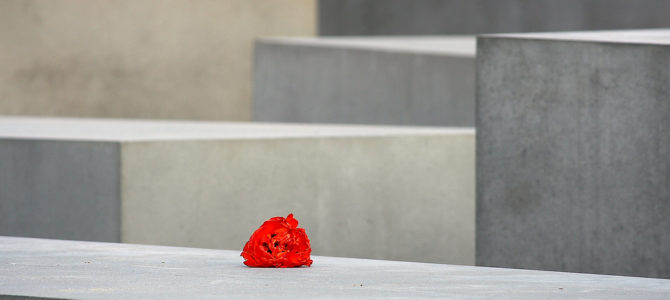
The Holocaust is an endless source of mourning and reflection, but on this day of remembrance, we should take a moment to heed the wisdom of one of Auschwitz’ most famous survivors: Dr. Viktor Frankl.
Before he and his wife were sent to Auschwitz in 1944, Frankl was a Jewish neurologist and psychiatrist in Vienna. He lost his wife, mother and brother in the Holocaust. In 1946, he published a book on his experiences and their effect on his work as a psychiatrist. This international bestseller’s English title is, “Man’s Search for Meaning.”
As Frankl learned well, the answers to questions about our existence rarely come in prosperity, but instead through hardship. In remembrance, we should ask ourselves the same questions that life once asked of Viktor Frankl.
What Keeps You Going in the Face of Suffering?
Though anyone’s survival was a miracle, Frankl continually saw that physical strength was not the best predictor of who would survive the death camps. Many who were in good physical condition perished while the physically feeble endured.
Entering what Frankl refers to as a “provisional existence,” the prisoners at Auschwitz not only faced untold horrors, but also perpetual uncertainty. One could not know whether there lay any future for life beyond the camp. Many prisoners could not see through their present misery and retreated to the emotional safety of the past. But by doing this, he says, their present lives became pointless to them.
“Such people forgot that often it is such an exceptionally difficult external situation which gives man the opportunity to grow spiritually beyond himself,” he writes. “Instead of taking the camp’s difficulties as a test of their inner strength, they did not take their life seriously and despised it as something of no consequence.”
The hope of a future, whether envisioning a reunion with family or returning to their old professions, kept many going beyond the point of physical strength. Though at some times it seemed impossible, Frankl saw that man “can only live by looking into the future … And this is his salvation in the most difficult moments of existence, although he sometimes has to force his mind to the task.”
Are We Worthy of Our Suffering?
Envisioning a future was necessary, but not sufficient, for enduring life in the camps. A future goal was not some selfish, self-help tactic. Meeting unbearable suffering with hope and joy could only be done by looking outside oneself. Frankl’s source of strength was to ask what his wife would expect from him in such a situation. Would she want him to despair? Or to let his character live up to his circumstances?
“…someone looks down on each of us in difficult hours — a friend, a wife, somebody alive or dead, or a God — and he would not expect us to disappoint him. He would hope to find us suffering proudly — not miserably — knowing how to die.”
One of his strongest recollections was speaking to a young girl who knew she was dying. She was still cheerful. She found peace in gazing at a budding chestnut tree just outside her window. She told Frankl that she had been spoiled in her old life. Now she was grateful for her suffering because it had shown her the value of spiritual strength.
Frankl concluded that this reaction to sorrow was a decision — not just the sum total of the misery around them. “In the final analysis it becomes clear that the sort of person the prisoner became was the result of an inner decision and not the result of camp influences alone. Fundamentally, therefore, any man can, even under such circumstances, decide what will become of him — mentally and spiritually. He may retain his human dignity even in a concentration camp … It is this spiritual freedom which cannot be taken away that makes life meaningful and purposeful.”
Men and women, who were powerless to change their surroundings, instead changed themselves. Rising above themselves was their true freedom.
Do We Have a Realistic View of Humanity?
Unlike the sorrows of disease or natural disaster, the Holocaust was a man-made tragedy. This presents us with a difficult and complex reality.
Dr. Josef Mengele, whose name still resonates with cavernous evil, worked at Auschwitz. A disciple of Nazi eugenics, he performed ghastly experiments on prisoners, mostly children. He surgically sewed children together as mock siamese twins. He injected chemicals into eyes, often blinding the patient, in the attempt to change their color to “Aryan blue.” In fact, one survivor recalled a laboratory wall at Auschwitz being covered in human eyes, extracted from Mengele’s victims. His nickname was the “Angel of Death.”
And at the same time, Viktor Frankl was also at Auschwitz. So was the dying girl who took delight in the company of a tree. Humans are not “basically good.” There are extremes of both good and evil that we do not see every day. Lord willing, we will not have the chance to see the extremes that Frankl did. However, we should remember that our decisions, not our circumstances, dictate which we will be.
“Man has both potentialities within himself; which one is actualized depends on decisions but not on conditions,” Frankl writes. “Our generation is realistic, for we have come to know man as he really is. After all, man is that being who invented the gas chambers of Auschwitz; however, he is also that being who entered those gas chambers upright, with the Lord’s Prayer or the Shema Yisrael on his lips.”









